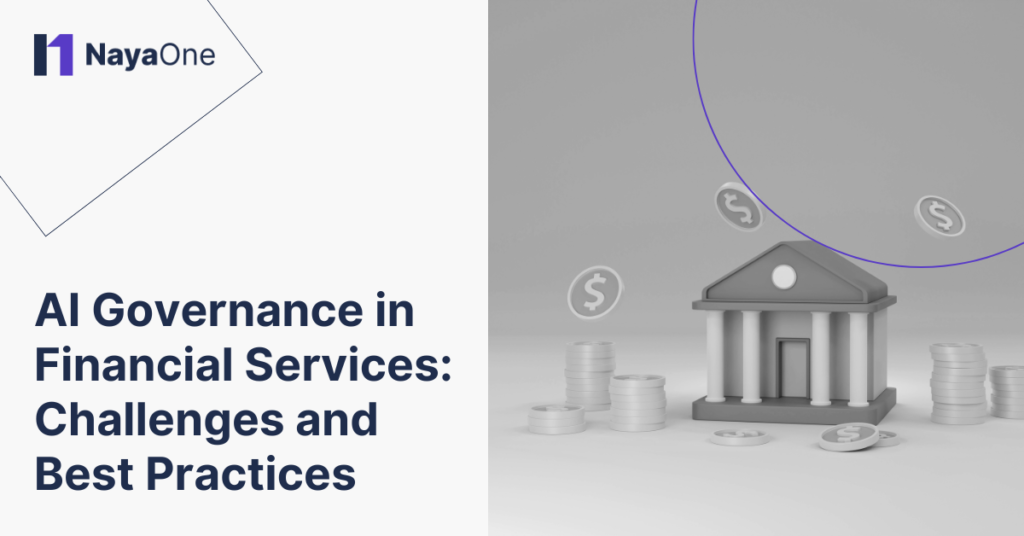
Oli Platt
Head of Client Solutions
You can forget the financial services industry as it is. Artificial intelligence (AI) has been revolutionising operations, enhancing decision-making processes, and unlocking new avenues for growth. However, as AI technologies continue to proliferate, so do the complexities and challenges of AI governance. Ensuring the responsible and ethical use of AI in financial services has become paramount. It’s prompting the development of robust governance frameworks to mitigate risks and foster trust among stakeholders.
What Is AI Governance in Financial Services?
AI governance refers to the set of policies, processes, and controls that ensure responsible, ethical, and effective use of artificial intelligence (AI) technologies within organisations. It encompasses various aspects, including data privacy, transparency, accountability, fairness, and security, aimed at mitigating risks and maximising the benefits of AI.
The Role of AI Governance in Financial Services
AI offers unparalleled opportunities for innovation, efficiency, and competitive advantage. From algorithmic trading and risk management to customer service and fraud detection, AI-powered technologies have transformed how financial institutions operate and interact with their customers. However, with the increasing adoption of AI comes a pressing need for effective AI governance. It can help manage potential risks and ensure compliance with regulatory requirements. The significance of AI governance in financial services can. It plays a pivotal role in safeguarding against potential harm and maintaining trust in the integrity of financial systems.
Why Is Effective Governance Essential for Managing Risks and Ensuring Compliance
One primary reason for the importance of AI governance is the inherently complex nature of AI systems. Unlike traditional software programs, AI algorithms often operate in a dynamic and opaque manner. This makes it challenging to fully understand their decision-making processes and potential implications. As such, robust governance frameworks are essential to ensure transparency, accountability, and ethical use of AI technologies. Moreover, in an industry as heavily regulated as finance, adherence to regulatory requirements is paramount. Financial institutions must navigate complex regulations, such as the EU AI Act, the first government regulation of AI in the world. They cover areas such as data privacy, consumer protection, risk management, and anti-money laundering. Effective AI governance ensures that organisations remain compliant with these regulations, mitigating the risk of regulatory penalties and reputational damage. Furthermore, artificial intelligence governance is critical for managing risks associated with data privacy and security. Financial institutions handle vast amounts of sensitive customer data. The use of AI introduces new challenges in protecting this data from unauthorised access or misuse. A robust governance framework ensures that appropriate safeguards are in place to protect data privacy and mitigate cybersecurity risks associated with AI applications.
Key Challenges in AI Governance
Despite the transformative potential of AI in the financial services sector, its effective governance poses several significant challenges. These challenges include:
Data Quality and Bias Mitigation
Ensuring the quality, accuracy, and fairness of data used to train AI models is paramount. Biases in historical data can perpetuate discriminatory outcomes, leading to ethical and regulatory concerns.
Model Transparency and Explainability
The opacity of AI models, often referred to as “black boxes,” makes it challenging to understand their decision-making processes. Regulatory requirements demand transparency and explainability to ensure accountability and trustworthiness.
Regulatory Compliance
Navigating complex regulatory landscapes while deploying AI systems involves interpreting existing regulations and ensuring compliance with emerging AI-specific guidelines. Regulatory bodies worldwide are grappling with the dynamic nature of AI, requiring financial institutions to adapt at record speed.
Ethical Use of AI
Ethical considerations surrounding artificial intelligence governance involve addressing potential societal impacts. These include job displacement, algorithmic discrimination, and privacy infringements. Establishing ethical frameworks and guidelines is essential to promote responsible AI adoption.
Cybersecurity and Data Privacy
AI systems in financial services are prime targets for cyber threats and data breaches. Protecting sensitive financial data and ensuring compliance with data privacy regulations are critical components of AI governance.
Talent Acquisition and Skill Development
Building and maintaining AI capabilities requires a skilled workforce proficient in AI technologies, data analytics, and regulatory compliance. The scarcity of talent in these areas poses a significant challenge for financial institutions.
Vendor Management and Third-Party Risks
Financial institutions often rely on third-party vendors for AI solutions. This introduces additional complexities in governance. Managing vendor relationships, assessing third-party risks, and ensuring compliance with regulatory standards are essential aspects of AI governance. Addressing these challenges requires a comprehensive approach to artificial inteligence governance. It must integrate legal, ethical, technological, and organisational considerations. Financial institutions must prioritise transparency, accountability, and risk management to foster trust and confidence in AI-driven decision-making processes.
Best Practices for Effective AI Governance
To navigate the complexities of in financial services effectively, institutions can adopt several best practices:
Establish Clear Governance Structures
Define roles and responsibilities within the organisation for overseeing AI initiatives. Have dedicated governance committees or task forces responsible for setting policies, monitoring compliance, and addressing ethical considerations.
Develop Robust Risk Management Frameworks
Implement risk management frameworks tailored to AI systems. This must encompass risk identification, assessment, mitigation, and monitoring throughout the AI lifecycle. Then, integrate AI risk assessments into existing enterprise risk management processes.
Prioritise Transparency and Explainability
Promote transparency and explainability in AI systems to enhance accountability and trust. Document AI models, algorithms, and decision-making processes comprehensively. This will enable stakeholders to understand and audit their functioning.
Ensure Data Quality and Bias Mitigation
Implement measures to enhance data quality, integrity, and fairness, including data preprocessing techniques, bias detection algorithms, and diversity in training datasets. Regularly audit and validate data sources to identify and address biases.
Foster Ethical AI Practices
Develop ethical guidelines and principles for AI usage, making sure they align with organisational values and regulatory requirements. Consider the societal impacts of AI applications and prioritise ethical considerations in AI design, development, and deployment.
Enhance Cybersecurity and Data Privacy Measures
Implement robust cybersecurity protocols and data privacy safeguards to protect AI systems from cyber threats and ensure compliance with regulatory requirements, such as data encryption, access controls, and secure data handling practices.
Invest in Talent Development and Training
Build a skilled workforce equipped with AI expertise, data analytics capabilities, and regulatory knowledge through training programmes, upskilling initiatives, and recruitment strategies focused on attracting top talent in AI and related fields.
Foster Collaboration and Knowledge Sharing
Promote collaboration across internal teams, industry peers, academia, and regulatory bodies to share best practices, insights, and lessons learned in AI governance. Engage in industry forums, working groups, and knowledge-sharing platforms to stay abreast of emerging trends and regulatory developments.
Implement Continuous Monitoring and Evaluation
Establish mechanisms for ongoing monitoring, evaluation, and performance measurement of AI systems. This will help you detect anomalies, assess effectiveness, and identify areas for improvement. Implement feedback loops and adaptive governance mechanisms to address evolving risks and regulatory requirements.
Stay Agile and Adaptive
Embrace agility and adaptability in artificial intelligence governance practices. You’ll be able to respond effectively to changing business needs, technological advancements, and regulatory landscapes. Continuously review and update governance policies, procedures, and controls to ensure alignment with organisational objectives and external requirements. By adopting these best practices, financial institutions can strengthen their AI governance frameworks, mitigate risks, and foster responsible and ethical AI-driven innovation in the financial services sector.
Future Trends and Considerations
As the financial services industry continues to embrace artificial intelligence (AI) technologies, several future trends and considerations are shaping the landscape of AI governance:
Regulatory Evolution
The EU AI Act paved the way to government regulation of AI. However, the UK government AI strategy will impact not just the UK, but the entire world. As a result, the US government’s AI regulation efforts are also intensifying, with President Biden’s Executive Order on AI marketing the first step toward AI regulation in the US. Anticipate further evolution of regulatory frameworks governing AI in financial services. This includes the development of industry-specific guidelines, standards, and compliance requirements. Stay informed about regulatory updates and emerging best practices to ensure ongoing alignment with regulatory expectations.
Ethical AI and Responsible Innovation
Emphasise ethical AI practices and responsible innovation to address societal concerns, promote transparency, fairness, and accountability in AI decision-making, and mitigate potential risks of bias, discrimination, and unintended consequences. Proactively engage stakeholders to solicit feedback and integrate ethical considerations into AI governance processes.
Explainable AI and Model Interpretability
Focus on enhancing the explainability and interpretability of AI models to facilitate understanding of AI-driven decisions by stakeholders, regulators, and end-users. Invest in research and development of interpretable AI techniques and tools that provide insights into AI decision-making processes.
AI Governance Frameworks and Standards
Develop comprehensive AI governance frameworks and industry standards tailored to the unique characteristics and challenges of AI in financial services. Collaborate with industry peers, regulators, and standard-setting bodies to establish common guidelines, principles, and benchmarks for AI governance, potentially leveraging AI sandboxes as platforms for testing and validating governance frameworks.
AI Risk Management and Assurance
Strengthen AI risk management practices and assurance mechanisms to proactively identify, assess, and mitigate risks associated with AI systems. This includes operational, ethical, legal, and reputational risks. Implement robust controls, monitoring, and auditing processes to ensure compliance with regulatory requirements and organisational policies, leveraging an AI Sandbox to assess the effectiveness of risk management strategies in a controlled environment.
Human-AI Collaboration
Embrace a human-centric approach to AI governance that emphasises collaboration between humans and AI systems. This will allow you to leverage the complementary strengths of both.
Cross-Border Collaboration and Data Sharing
Foster cross-border collaboration and data-sharing initiatives to address global challenges. You’ll also promote interoperability and facilitate the responsible exchange of data and insights for AI development and deployment. Navigate complex data protection and privacy regulations while exploring innovative solutions for data collaboration, such as cross-border AI sandbox initiatives aimed at fostering international cooperation in AI research and development.
Innovation Ecosystems and Emerging Technologies
Monitor developments in AI innovation ecosystems, including advancements in machine learning, deep learning, natural language processing, and reinforcement learning. Stay on top of emerging technologies, trends, and use cases that may impact the future trajectory of AI governance in financial services, potentially through participation in collaborative AI sandbox initiatives aimed at fostering innovation and experimentation.
Talent Development and Diversity
Invest in talent development initiatives and programmes to cultivate a skilled workforce with diverse perspectives, backgrounds, and expertise in AI, data science, and related fields. Promote inclusivity, creativity, and innovation by fostering a culture of continuous learning and knowledge sharing.
Adaptive Governance and Continuous Improvement
Embrace adaptive governance approaches that enable agility, flexibility, and continuous improvement in AI governance practices. Iterate on governance frameworks, policies, and processes based on lessons learned, feedback from stakeholders, and evolving industry dynamics to ensure relevance and effectiveness over time, potentially leveraging AI sandbox environments as testing grounds for innovative governance strategies and approaches.
Boost Your Financial Institution’s Resilience with NayaOne’s AI Sandbox
Artificial intelligence continuously transforms the landscape of financial services. Effective governance is paramount to ensure responsible AI deployment, mitigate risks, and foster innovation. AI governance encompasses a broad spectrum of considerations, including regulatory compliance, ethical principles, risk management, and human-AI collaboration. An AI Sandbox is an invaluable tools for financial institutions and regulators alike.
Trusted by world’s leading banks and financial institutions, NayaOne’s AI Sandbox offers a controlled environment for testing and validating AI applications under regulatory supervision. It enables stakeholders to experiment with new technologies, assess their impact, and refine governance frameworks. By leveraging NayaOne’s AI Sandbox, financial institutions can accelerate innovation, enhance risk management capabilities, and demonstrate compliance with regulatory requirements.
As a result, financial institutions can navigate the complexities of AI deployment, harness its transformative potential, and drive sustainable value creation in the digital era. As the financial services industry continues to evolve, AI governance and AI sandboxes will play increasingly critical roles in shaping the future of finance and ensuring its resilience in an AI-driven world.





